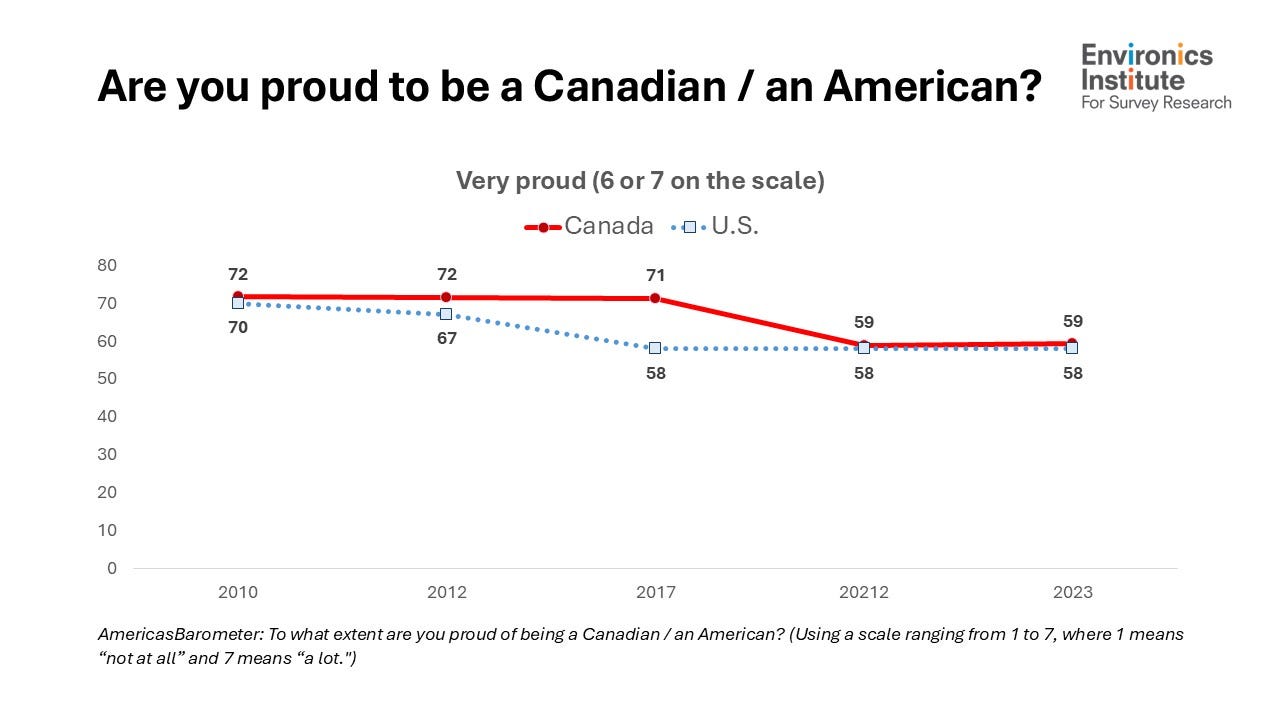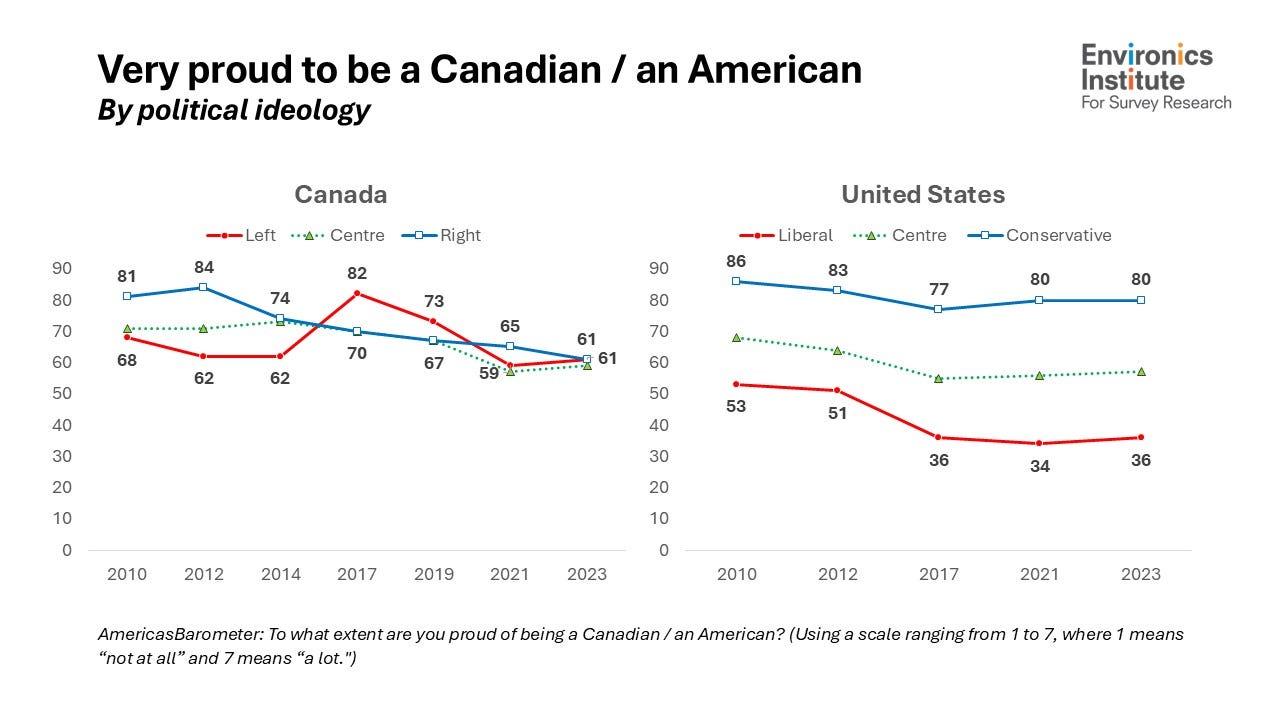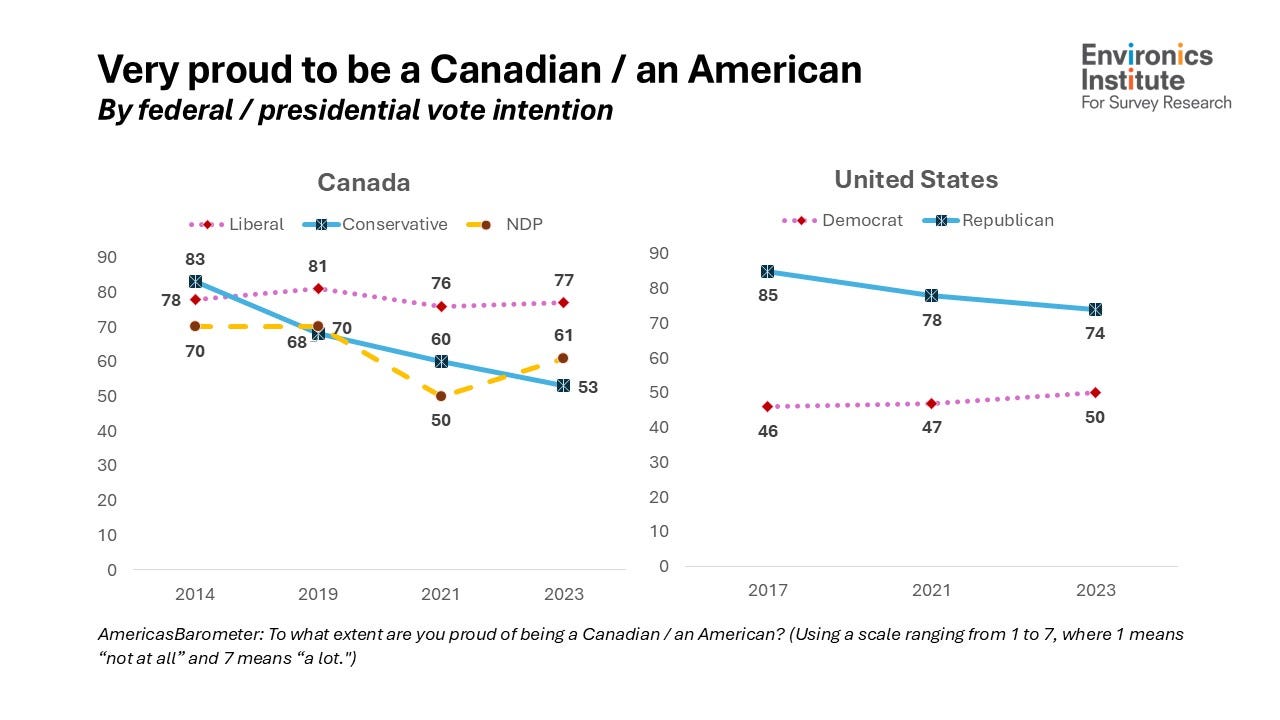A short follow-up to my earlier discussion on the extent to which people feel proud of being Canadian – I promised a comparison with the situation in the United States.
Here’s how that looks.
Two initial observations. First, if you assumed that, on the whole, boastful Americans would be more likely than modest Canadians to feel very proud of being from their country, well... you were mistaken. Second, the extent to which people feel very proud has declined recently in both countries, and more or less to the same extent.
The political dynamics associated with this decline are, however, quite different in the two countries. We can show this by looking at how national pride relates to political ideology (in Canada, the survey uses a left-right scale; in the United States, the scale runs from liberal to conservative).
As we saw last time, national pride in Canada bounced up among those on the left following the 2015 election, but has since ebbed back down – ending up at more or less the same level in 2023 as it was in 2012. Among those on the right, by contrast, there has been a steady decline since 2012, totalling 23 percentage points.
The pattern in the United States could hardly be more different. First, national pride is much more strongly associated with political ideology. The astonishing 44-point gap in the extent to which liberals and conservatives feel very proud of being an American in 2023 contrasts with a zero-point gap in strong feelings of national pride between left-leaning and right-leaning Canadians. (Even the larger 22-point gap in Canada that appeared in 2012 was significantly smaller than the 32-point gap in the U.S. that same year.)
Second, since 2012, strong feelings of national pride in the U.S. have declined much more among liberals (down 15 points) than conservatives (down 3 points). This is presumably related to the political tenor of the country that emerged following the election of Donald Trump as president in 2016.
The patterns by federal vote intention are also interesting – but, unfortunately, this question is not included in every survey.* It’s not surprising that the pattern differs somewhat from the one we see when we look at political ideology, because not all liberals vote Democrat, and not all conservatives vote Republican (click here to read more about how this plays out in Canada).
Here’s what we have:
In both countries, strong feelings of national pride have fallen more for voters supporting right-leaning parties (Conservative supporters in Canada and Republican supporters in the U.S.) – with the time periods in each case covering the return to power of their political opponents (Liberals in Canada in 2015 and Democrats in the United States in 2020).
Perhaps the most interesting comparison, though, is between the two right-leaning parties and the two left-leaning parties. The decline in strong feelings of national pride has been much more pronounced among Conservative supporters in Canada than Republican supporters in the U.S. – these two groups of partisans looked similar in this regard a few years ago, but are now separated by 21 percentage points. In fact, the level of strong national pride expressed by Canadian Conservative supporters today is much closer to that of U.S. Democrat supporters than Republican supporters.
Meanwhile, Liberal supporters in Canada have been consistently more likely than supporters of the Democrats in the United States to feel very proud of their nationality (yet another reason to be skeptical of the story that I referenced at the start of this series). The extent to which this gap may narrow in the coming years, depending on the outcome of the U.S. presidential election this November, remains to be seen.
*While the U.S. presidential vote intention question is not available prior to 2017, the survey included a question about party identification. Between 2012 and 2017 (either side of the 2016 election), the proportion of those identifying with the Democratic Party who felt very proud of being an American fell by 17 percentage points, from 67 percent to 50 percent.
The findings featured in this post are from the Canadian portion of the AmericasBarometer. The AmericasBarometer is a biennial comparative survey of democratic values and behaviours that covers countries in North, Central and South America, as well as a significant number of countries in the Caribbean (the 2023 survey covers 25 countries). The project is led by the Latin American Public Opinion Project (LAPOP) at Vanderbilt University.
The survey is the most comprehensive source of information about support for democracy in Canada. Follow the Environics Institute to catch more reports from this survey.
The 2023 AmericasBarometer in Canada survey was conducted by the Environics Institute for Survey Research, in partnership with LAPOP at Vanderbilt University. It was conducted online with a representative sample of 2,500 Canadians (aged 18 and over) between July 20 and August 4, 2023. The author is solely responsible for any errors of presentation or interpretation.
AmericasBarometer data for the United States were supplied by the Latin American Public Opinion Project at Vanderbilt University, which takes no responsibility for any interpretation of the data. The 2023 survey in the U.S. was conducted online with a representative sample of 1,500 Americans (aged 18 and over) between July 21 and July 26, 2023.
What is the Environics Institute for Survey Research? Find out by clicking here.
Follow us on other platforms:
· Twitter: @Environics_Inst or @parkinac
· Instagram and Threads: environics.institute








Always interesting the contrast between US and Canada in terms of political affiliation, general ideological leaning and how the government in power has an impact on national pride.